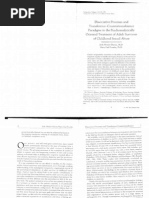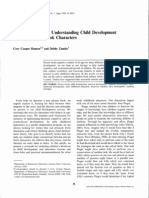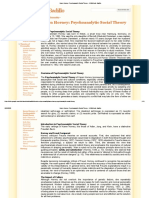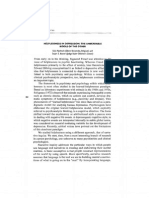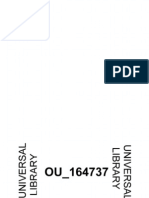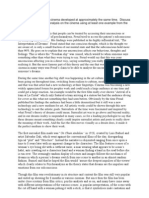0 ratings0% found this document useful (0 votes)
134 viewsAnna Freud
Anna Freud
Uploaded by
yoshita bhargavaAnna Freud was an Austrian-British psychoanalyst born in 1895 in Vienna. She was the daughter of Sigmund Freud and is recognized as the founder of child psychoanalysis. She made significant contributions to the understanding of child development and defense mechanisms. Throughout her career, she advanced psychoanalytic theory and practice, established training programs, and cared for her ailing father. Anna Freud dedicated her life to further developing psychoanalysis and its application to children.
Copyright:
© All Rights Reserved
Available Formats
Download as PPTX, PDF, TXT or read online from Scribd
Anna Freud
Anna Freud
Uploaded by
yoshita bhargava0 ratings0% found this document useful (0 votes)
134 views14 pagesAnna Freud was an Austrian-British psychoanalyst born in 1895 in Vienna. She was the daughter of Sigmund Freud and is recognized as the founder of child psychoanalysis. She made significant contributions to the understanding of child development and defense mechanisms. Throughout her career, she advanced psychoanalytic theory and practice, established training programs, and cared for her ailing father. Anna Freud dedicated her life to further developing psychoanalysis and its application to children.
Original Description:
a presentation on Anna Freud
Copyright
© © All Rights Reserved
Available Formats
PPTX, PDF, TXT or read online from Scribd
Share this document
Did you find this document useful?
Is this content inappropriate?
Anna Freud was an Austrian-British psychoanalyst born in 1895 in Vienna. She was the daughter of Sigmund Freud and is recognized as the founder of child psychoanalysis. She made significant contributions to the understanding of child development and defense mechanisms. Throughout her career, she advanced psychoanalytic theory and practice, established training programs, and cared for her ailing father. Anna Freud dedicated her life to further developing psychoanalysis and its application to children.
Copyright:
© All Rights Reserved
Available Formats
Download as PPTX, PDF, TXT or read online from Scribd
Download as pptx, pdf, or txt
0 ratings0% found this document useful (0 votes)
134 views14 pagesAnna Freud
Anna Freud
Uploaded by
yoshita bhargavaAnna Freud was an Austrian-British psychoanalyst born in 1895 in Vienna. She was the daughter of Sigmund Freud and is recognized as the founder of child psychoanalysis. She made significant contributions to the understanding of child development and defense mechanisms. Throughout her career, she advanced psychoanalytic theory and practice, established training programs, and cared for her ailing father. Anna Freud dedicated her life to further developing psychoanalysis and its application to children.
Copyright:
© All Rights Reserved
Available Formats
Download as PPTX, PDF, TXT or read online from Scribd
Download as pptx, pdf, or txt
You are on page 1of 14
Born- December 3, 1895, Vienna, Austria
Died: October 9, 1982, London, United Kingdom
Citizenship: Austrian
Known for: Work on the nature of ego
Founder of child psychoanalysis
Defence mechanisms
Anna Freud did more than live in her father's rather
long shadow.
She becomes one of the world's foremost
psychoanalysts and is recognized as the founder of
child psychoanalysis, despite the fact that her father
often suggested that children could not be
psychoanalyzed.
She declared that she learned far more at home from
her father and his guests and indeed acquired
knowledge of psychoanalysis from the group to which
few others had access, and this grounded her life-long
contributions to the field.
Her first book, which is a series of lectures for teachers
and parents.
In 1923 she began her own psychoanalytical practice
with children and two years later was conducting a
seminar at the Vienna Psychoanalytic Training
Institute on the technique of child analysis.
Her work here resulted in this book.
In 1923 Sigmund Freud began suffering from cancer
and became increasingly dependent on Anna's care
and nursing
Later on, when he needed treatment in Berlin, she was
the one who accompanied him there.
In early September 1939 war broke out and within a
few weeks Sigmund Freud died.
Sigmund Freud’s illness was also the reason why a
"Secret Committee" was formed to protect
psychoanalysis against attacks.
From 1927 to 1934 Anna Freud was General Secretary
of the International Psychoanalytical Association. She
continued her child analysis practice and ran seminars
on the subject, organized conferences and, at home,
continued to help nursing her father.
The details of Anna Freud's personal life are
consistently cryptic.
But it is certain that her father was the only man in her
life long-term.
The letters ''convey the picture of an affectionate,
intensely human Anna Freud without a trace of
rigidity or psychoanalytic orthodoxy. Here is a shy
young woman of deep feeling. '‘
Indeed she said of herself, ''I was always looking
outside myself for strength and confidence but it
comes from within. It is there all the time.''
In 1965, she received the Dolly Madison Award.
In 1967, she was named a Commander of the British
Empire by Queen Elizabeth II.
In 1975, she was awarded an MD degree from the
University of Vienna. The same year, she also received
the Grand Decoration of Honour in Gold
She created the field of child psychoanalysis and her
work contributed greatly to the understanding of child
psychology. She noted that children’s symptoms
differed from those of adults and were often related to
developmental stages.
One of her most significant published works is ‘The
Ego and the Mechanisms of Defence’ in which she
outlined and expanded upon her father's theory of
psychological defence mechanisms.
“Creative minds have always been known to survive
any kind of bad training.”
“I was always looking outside myself for strength and
confidence but it comes from within. It is there all the
time.”
“Create around one at least a small circle where
matters are arranged as one wants them to be.”
About Education, "Anna Freud Biography (1895-1982)"
Reserved from;
http://psychology.about.com/od/profilesofmajorthinkers/
p/bio_annafreud.htm
FREUD MUSEUM LONDON, "TIMELINE"; Reserved from;
http://www.freud.org.uk/education/timeline
Psychology's Feminist Voices, "anna-freud" Reserved from;
http://www.feministvoices.com/anna-freud
Person of the Issue: Anna Freud (1895-1982) (PDF Download
Available). Available from:
https://www.researchgate.net/publication/287491837_Pers
on_of_the_Issue_Anna_Freud_1895-1982
You might also like
- Khan and Winnicott Poems and Other WorksDocument8 pagesKhan and Winnicott Poems and Other WorksAna Inés100% (1)
- Davis Frawley Dissociative Processes AndTransference-CountertransferenceDocument17 pagesDavis Frawley Dissociative Processes AndTransference-CountertransferenceMiguel Ángel Ríos100% (1)
- The Conflict Between MourningDocument22 pagesThe Conflict Between MourningalbertoadalidNo ratings yet
- Selected Papers of Karl AbrahamDocument536 pagesSelected Papers of Karl AbrahamJpildain1970No ratings yet
- The Nature of Creativity - FreudDocument14 pagesThe Nature of Creativity - FreudRoxanaTatariciNo ratings yet
- Fairbairn Psychoanalytic Studies of The Personality PDFDocument2 pagesFairbairn Psychoanalytic Studies of The Personality PDFBella100% (1)
- Stolorow - NarcisismulDocument6 pagesStolorow - NarcisismulstressalexNo ratings yet
- Critical Lenses Literary TheoriesDocument9 pagesCritical Lenses Literary TheoriesRussel100% (1)
- Interpretation in ReverseDocument5 pagesInterpretation in ReverseigarathNo ratings yet
- Lacan Lecture On The BodyDocument3 pagesLacan Lecture On The BodyArka ChattopadhyayNo ratings yet
- Theories of Personality NotesDocument13 pagesTheories of Personality NotestoodleditsNo ratings yet
- Anna FreudDocument31 pagesAnna FreudAnjali Daisy100% (1)
- The Mother's Signature: A Journal of DreamsFrom EverandThe Mother's Signature: A Journal of DreamsRating: 5 out of 5 stars5/5 (1)
- European Psychotherapy 2014/2015: Austria: Home of the World's PsychotherapyFrom EverandEuropean Psychotherapy 2014/2015: Austria: Home of the World's PsychotherapyNo ratings yet
- A Study Guide for Psychologists and Their Theories for Students: SIGMUND FREUDFrom EverandA Study Guide for Psychologists and Their Theories for Students: SIGMUND FREUDNo ratings yet
- Course Title: Theories of Personality Section FacultyDocument9 pagesCourse Title: Theories of Personality Section FacultyAJ commsNo ratings yet
- Modell, A.H. (1991) - A Confusion of Tongues or Whose Reality Is ItDocument8 pagesModell, A.H. (1991) - A Confusion of Tongues or Whose Reality Is ItCiprian JurmaNo ratings yet
- Kutash-Wolf. Psychoanalysis in GroupsDocument12 pagesKutash-Wolf. Psychoanalysis in GroupsJuanMejiaNo ratings yet
- Andre Green at the Squiggle Foundation Jan Abram 2024 Scribd DownloadDocument55 pagesAndre Green at the Squiggle Foundation Jan Abram 2024 Scribd Downloadhiedieldinzh100% (4)
- R01 - Baldwin 1987 - Salient Private Audiences & Awareness of The SelfDocument12 pagesR01 - Baldwin 1987 - Salient Private Audiences & Awareness of The SelfGrupa5No ratings yet
- Psychoanalysis, Existentialism, Philosophy - Donald CarvethDocument5 pagesPsychoanalysis, Existentialism, Philosophy - Donald CarvethA. KiNo ratings yet
- Scharff Sobre FairbairnDocument21 pagesScharff Sobre FairbairnAntonio TariNo ratings yet
- Psychodynamic Perspective EXAMPLES of FREUDDocument4 pagesPsychodynamic Perspective EXAMPLES of FREUDIsrael AsinasNo ratings yet
- Biography Alfred AdlerDocument4 pagesBiography Alfred AdlerEye SyahNo ratings yet
- Magagna - Female Sexual IdentityDocument20 pagesMagagna - Female Sexual IdentityJulián Alberto Muñoz FigueroaNo ratings yet
- Freud's WolfmanDocument21 pagesFreud's WolfmanJess RoseNo ratings yet
- Bion and babiesVUDocument6 pagesBion and babiesVUkarine botelhoNo ratings yet
- Payment PDFDocument35 pagesPayment PDFLauraMariaAndresanNo ratings yet
- BION-THE WORK GROUP - Final Resubmission September 2009Document21 pagesBION-THE WORK GROUP - Final Resubmission September 2009Carl RoosNo ratings yet
- More Simply Human - On The Universality of Madness (Nancy McWilliams)Document11 pagesMore Simply Human - On The Universality of Madness (Nancy McWilliams)Anastasiya Plohih100% (1)
- F Robert Rodman: Dr. True SelfDocument8 pagesF Robert Rodman: Dr. True SelfXavier De Lecaros-AquiseNo ratings yet
- Dufresne - Killing Freud (Twentieth Century Culture and The Death of Psychoanalysis)Document223 pagesDufresne - Killing Freud (Twentieth Century Culture and The Death of Psychoanalysis)10961408No ratings yet
- Magagna, J. and Pepper Goldsmith, T. (2009) - Complications in The Development of A Female Sexual Identity.Document14 pagesMagagna, J. and Pepper Goldsmith, T. (2009) - Complications in The Development of A Female Sexual Identity.Julián Alberto Muñoz FigueroaNo ratings yet
- Melanie Klein and Anna Freud The Discourse of The Early DisputeDocument12 pagesMelanie Klein and Anna Freud The Discourse of The Early DisputeKelly EnglandNo ratings yet
- Balint's InfluenceDocument17 pagesBalint's InfluencekimonggNo ratings yet
- Touched Fire Manic Depressive Artistic Temperament 068483183XDocument3 pagesTouched Fire Manic Depressive Artistic Temperament 068483183XBaihaqi33% (3)
- Melanie KleinDocument11 pagesMelanie Kleinrebekah laydaNo ratings yet
- Piaget, Meet Lilly Understanding Child DevelopmentDocument8 pagesPiaget, Meet Lilly Understanding Child DevelopmentPruna LaurentiuNo ratings yet
- BOWLBY, J. 1958. The Nature of Child's Bond To His Mother.Document24 pagesBOWLBY, J. 1958. The Nature of Child's Bond To His Mother.Mariana AragónNo ratings yet
- The Characteristic of Object Relations Theory AreDocument2 pagesThe Characteristic of Object Relations Theory AreSabyasachi BiswasNo ratings yet
- Contemporary Psychoanalysis: To Cite This Article: León Grinberg M.D. (1979) Countertransference and ProjectiveDocument24 pagesContemporary Psychoanalysis: To Cite This Article: León Grinberg M.D. (1979) Countertransference and Projectivev_azygosNo ratings yet
- Psychoanalytic Supervision Group, IndianapolisDocument1 pagePsychoanalytic Supervision Group, IndianapolisMatthiasBeierNo ratings yet
- Theories of PersonalityDocument13 pagesTheories of PersonalityAmeen ShaikNo ratings yet
- McDougall, William and Watson, John, ''The Battle of Behaviorism - An Exposition and An Exposure'', 1929.Document100 pagesMcDougall, William and Watson, John, ''The Battle of Behaviorism - An Exposition and An Exposure'', 1929.Stefan_Jankovic_83No ratings yet
- Teaching FCC To Psych - FullDocument9 pagesTeaching FCC To Psych - FullStgo NdNo ratings yet
- Deadmother SexualdevelopmentDocument1 pageDeadmother SexualdevelopmentCiprian Cătălin AlexandruNo ratings yet
- What Can Psychoanalysis Tell Us About Depression PDFDocument10 pagesWhat Can Psychoanalysis Tell Us About Depression PDFVarun ViswanathanNo ratings yet
- Systemic Family TherapyDocument13 pagesSystemic Family TherapyLissa LucastaNo ratings yet
- Erikson Eight Step PsikososialDocument12 pagesErikson Eight Step Psikososialwafa kamilahNo ratings yet
- Briggs - Time Limited Psychodynaic Psychotherapy For Adolescents and Young AdultsDocument16 pagesBriggs - Time Limited Psychodynaic Psychotherapy For Adolescents and Young AdultsJulián Alberto Muñoz FigueroaNo ratings yet
- D. Steiner - Illusion, Disillusion and Irony in PsychoanalysisDocument21 pagesD. Steiner - Illusion, Disillusion and Irony in PsychoanalysisHans CastorpNo ratings yet
- Fromm's Therapeutic Approach PDFDocument7 pagesFromm's Therapeutic Approach PDFskanzeniNo ratings yet
- Abraham, Nicolas - The Shell and The KernelDocument15 pagesAbraham, Nicolas - The Shell and The Kernelod_torreNo ratings yet
- Psikosomatics TodayDocument241 pagesPsikosomatics TodayhokNo ratings yet
- Death Anxiety PDFDocument8 pagesDeath Anxiety PDFSiti Rodlika Musyafa'ahNo ratings yet
- Williams (1999) Non-Interpretive Mechanisms inDocument16 pagesWilliams (1999) Non-Interpretive Mechanisms inLoratadinaNo ratings yet
- Epston Down Under and Up OverDocument193 pagesEpston Down Under and Up OvergabrielcastroxNo ratings yet
- Firstborn Personality TraitsDocument10 pagesFirstborn Personality TraitsBảo Trần QuốcNo ratings yet
- Bornstein, B. - On LatencyDocument8 pagesBornstein, B. - On LatencycabaretdadaNo ratings yet
- Edith Gould - Erotized Transference in A Male PatientDocument15 pagesEdith Gould - Erotized Transference in A Male PatientGogutaNo ratings yet
- Identity Paper Final DraftDocument8 pagesIdentity Paper Final Draftapi-333557232No ratings yet
- Mom, Mania, and Me: Surviving and Changing a Volatile RelationshipFrom EverandMom, Mania, and Me: Surviving and Changing a Volatile RelationshipNo ratings yet
- Bellak Thematic Apperception TestDocument9 pagesBellak Thematic Apperception Testyoshita.chikkyNo ratings yet
- Reproductions of MotheringDocument13 pagesReproductions of Motheringmaria07oliveira9No ratings yet
- Psychoanalysis Monotheism and Morality The Sigmund Freud Museum Symposia 2009 2011 1st Edition Wolfgang Muller-Funk 2024 Scribd DownloadDocument84 pagesPsychoanalysis Monotheism and Morality The Sigmund Freud Museum Symposia 2009 2011 1st Edition Wolfgang Muller-Funk 2024 Scribd Downloadyoslynmilens100% (1)
- Psychological View of The SelfDocument20 pagesPsychological View of The SelfSam ReigoNo ratings yet
- What Is Literary Criticism?: Click For NextDocument63 pagesWhat Is Literary Criticism?: Click For NextVicki PunzalanNo ratings yet
- Treatment of Abnormal BehaviorDocument5 pagesTreatment of Abnormal BehaviorTim ZeeNo ratings yet
- Shakespeare DramatikaDocument74 pagesShakespeare DramatikaMitjaHorvatNo ratings yet
- 5 1Document5 pages5 1Thison 2kNo ratings yet
- DOPT Sem 3Document4 pagesDOPT Sem 3Dhwaani DabasNo ratings yet
- GFVM1045Document44 pagesGFVM1045mae ctNo ratings yet
- 05 Helplessness in DepressionDocument5 pages05 Helplessness in DepressionAbhishekKurilNo ratings yet
- CH 28092 Social TeaterDocument25 pagesCH 28092 Social TeaterJansen BigTummyGuy SunNo ratings yet
- Examples of Psychoanalytic TheoryDocument13 pagesExamples of Psychoanalytic Theoryjaz bazNo ratings yet
- Mental Health and Hindu Psicology by Swami AkhilanandaDocument245 pagesMental Health and Hindu Psicology by Swami Akhilanandaapi-19985927100% (3)
- Introduction To Psychology: Humanities DepartmentDocument42 pagesIntroduction To Psychology: Humanities DepartmentIqra ShahidNo ratings yet
- Unit 2: Supportive Psychotherapy: A Basic Technique?Document11 pagesUnit 2: Supportive Psychotherapy: A Basic Technique?Luz TanNo ratings yet
- Bhms Organon McqsDocument230 pagesBhms Organon Mcqsayushwallah720No ratings yet
- Psychoanalysis Thesis TopicsDocument5 pagesPsychoanalysis Thesis TopicsTodd Turner100% (2)
- Foundations of PsychologyDocument2 pagesFoundations of PsychologyHayley Van SchoorNo ratings yet
- Unit 3 Systems and Theories of Psychology: StructureDocument11 pagesUnit 3 Systems and Theories of Psychology: StructureSumit SharmaNo ratings yet
- Psychology Freud - Dreaming NotesDocument3 pagesPsychology Freud - Dreaming NotesemilyNo ratings yet
- Monk Ambrosio On Freud's SofaDocument14 pagesMonk Ambrosio On Freud's Sofaantónio_gomes_47No ratings yet
- Criminology Module Description Module ObjectivesDocument117 pagesCriminology Module Description Module ObjectivesBarrack koderaNo ratings yet
- Psychoanalysis and The CinemaDocument5 pagesPsychoanalysis and The CinemaDavid Buckley100% (1)
- Biology of Carl Jung and Melanie KleinDocument2 pagesBiology of Carl Jung and Melanie Kleinrein villalobosNo ratings yet
- Download Full Entrepreneurship and Small Business 4th Asia Pacific Edition by Michael Schaper PDF All ChaptersDocument24 pagesDownload Full Entrepreneurship and Small Business 4th Asia Pacific Edition by Michael Schaper PDF All ChaptersarcticreilerNo ratings yet

